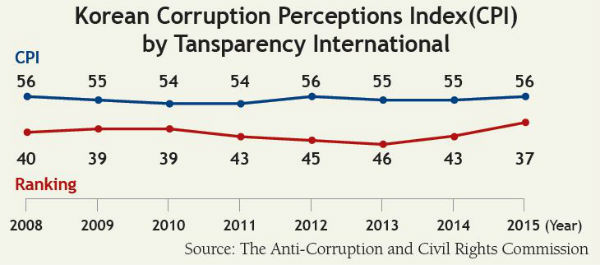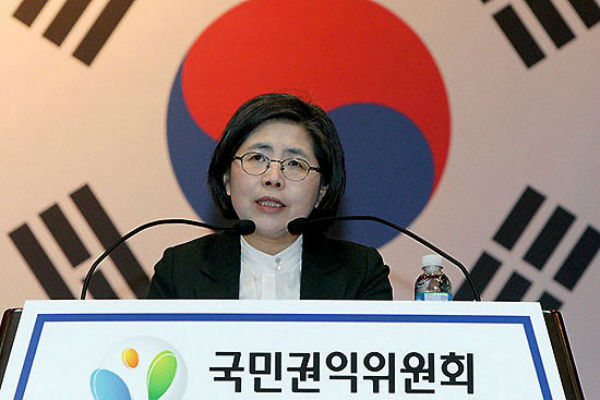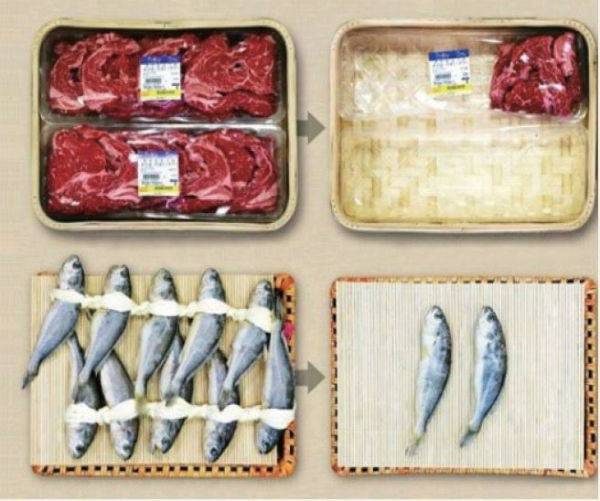On July 28, 2016, the Constitutional Court passed the Anti-Corruption and Bribery Prohibition Act, more commonly known as the Kim Young-ran Act, and its execution was scheduled to start from September 28. As arguments for and against the act have been ongoing intensely, the need for accurate understanding on the Kim Young-ran Act has risen. The Sungkyun Times (SKT) takes a closer look at the background and the concept of the law and explores various perspectives on this issue.
Background of the Kim Young-ran Act
Social Convention of Elite Cartel
Corruption and graft in Korean society are the starting point of the Kim Young-ran Act. Political corruption occurs when the volition for private usage of authority is combined with financial power. Korean society is in the paradox of corruption, the state in which negative and positive responses on corruption coexist. Due to perspectives that bribery and venality can sometimes be profitable, social order has never been free from the vicious cycle of demoralization. According to data from the National Tax Service, in 2015, the entertainment expenses paid by corporation cards amounted to about ₩10 trillion. This shows the consequence of an incessant social convention of sponsorship, nepotism, and illegal solicitation. Leading people of society, often called the Elite Cartel, consolidate their status by strengthening high entry barriers and monopolizing limited resources. They are also referred to as guan-fia, a combination of the terms “bureaucrat” and “mafia,” since high ranking officials abuse their power for private benefits to construct an extensive central force like the mafia. It is the current state of our society in which corruption works as one of the main causes of class immobility.
Low Corruption Perceptions Status
The most important factors that control corruption are social and judiciary regulations. Perception empowerment should be combined with legal improvement, since mere legal punishment fosters criminals and illegal solicitations or sponsorships without financial dealings. The recognition improvement status in Korean society is currently at a low level. In the case of domestic corruption perception, 59.2% of citizens recognized corruption, while only 3.4% of public officials did. This means that the level of integrity that citizens expect from public offices is far higher than the officials themselves realize. Furthermore, the global standard set by Transparency International shows that the Korean Corruption Perceptions Index (CPI) is relatively low compared to that of other countries. Korea’s CPI scored 56 out of 100 and ranked 37th out of 168 countries in 2015. It is 27th out of 34 OECD member nations.

Official Corruption Scandal
The decisive factor for the introduction of the Kim Young-ran Act is the official corruption scandal, called “sponsor prosecutor incident.” Sponsor prosecutors are current and former prosecutors who were provided with money, sexual favors, or meals. In April 2010, a representative of a construction industry reported to MBC that he had sponsored 57 prosecutors consistently. Evidence of bribery of ₩300 thousand to ₩500 thousand per month depending on the position of prosecutors was disclosed to the public. The prosecution constituted the “Presidential Truth Commission,” but the behind-the-scenes story was not revealed. Sexual favors and bribery were considerably underreported and most of the cases were acquitted for lack of evidence. Moreover, only four prosecutors out of the 40 who were suspected of collusion were arraigned, and the prosecution was suspended due to the expiration of the statute of limitations. The research group was indicted of concealing the truth, but they were also exonerated for lack of duty relations.
The Kim Young-ran Act, which includes the control of illegal solicitation and the reception of money and valuables, was introduced to provide a radical solution for corruption. Its main purpose is to improve the corruption perception status by promoting the reconsideration of our malfeasant society and recover people’s trust in the government and international credit standing.
Concept of the Kim Young-ran Act
The Kim Young-ran Act is a legislative review on the Improper Solicitation and Graft Act. The Kim Youn-ran Act prohibits illegal solicitations which are direct or conveyed through a third person. It imposes sanctions with charge of a fine on infringement, and with judicial punishments on officials who performed their duties through improper solicitations. The Kim Young-ran Act regulate 15 illegal solicitation categories and exceptive situations. Exceptions only allow civil complaints for public interest. They include conveyance of civil petitions for grievances and proposals of enactment, amendment, and abolition of legislations on policies and public businesses. The Kim Young-ran Act bans the acceptance and requirement of money and goods regardless of whether they were given with the expectation of reciprocity or not. When officials are provided with a bribe, they are treated by procedures for restitution to the provider or delivery to the head of a belonging organization. Standards of punishment depend on the duty relations and amount of money. If an official is provided with money or a meal of over ₩10 million at once or ₩30 million in a year, they can be charged a fine of under ₩300 million or penal servitude of under three years, even without specific duty relations. When it is under ₩10 million, a penalty of twice to five times the original amount of money is imposed, only if evidences of duty relations are corroborated.
The range of application for the Kim Young-ran Act includes the National Assembly, government contributed institutes, public officials of national and public schools, private school staff, the press, executives of the board, and spouses of officials. Valuables and goods regarded as bribery are all tangible or intangible benefits including cash, securities, property, invitation coupons, and advantages during personnel evaluations. They are largely categorized as meal entertainment, presents, and expenses for congratulations and condolences. The acceptable range for exception is specified in Article 8, Paragraph 3 as money and goods for smooth duty performance which are not against socially established rules. They include goods that high-ranking officials provide to low-ranking officials as encouragement or prizes, and those that promoters of formal events uniformly provide for participants. A decree regulates the maximum price of meal entertainment, presents, and expenses for congratulations or condolences at ₩30, 50, and 100 thousand respectively, thereby being called the 3.5.10 Clause.
Different Perspectives on the Kim Young-ran Act
1. Maintain or Reinforce
The stance of the Anti- Corruption and Civil Rights Commission is to maintain the final proposal passed during the National Assembly’s plenary session, while reinforcing some aspects.

1) Maintain
• Inclusion of Private Sector : Social leverage of private sectors like the press and private schools is substantial. Corruption in such sections triggers great ripple effects, and its damage is extensive, longstanding, and almost impossible to recover from. Therefore, although they are not public sectors, officials in private sectors need integrity. It is rather inevitable for the Kim Young-ran Act to be extended to civil society. Some opponents argue that the control of private sectors makes citizens out to be potential criminals, but the ordinance is rather a protective measure for those who are involved in public works, by providing rooms to refuse illegal solicitations or grafts. In the sense that the Kim Young-ran Act works as a way to strengthen responsibility and decrease the chance of corruption, it is not an excessive legislation nor a violation of equal rights for officials.
• Spouse Declaration : The Spouse Declaration Clause is an obligation for officials to report their spouses in case improper solicitation or bribery are accomplished through spouses. It was made to protect public officials, considering the cases of irregularities committed with spouses. In this sense, it is not an exaggeration to say that taking in money and goods via spouses is equivalent to bribing the officials. Furthermore, since the fundamental purpose of this ordinance is to impose a penalty for not reporting an acknowledged illegality, it is irrelevant to the violation of the implicative system.
• Ambiguity of the Concept : The Improper Solicitation and Graft Act regulated 15 illegal solicit categories and exceptive situations. Many opponents insist that the act is too abstract. The Anti-Corruption and Civil Rights Commission, however, does not agree on the argument that it is out of principle of clarity. Its position is that exceptive situations are explained through specific examples, and the current Public Service Ethics Act has already accumulated enough precedents for reference.
• 3.5.10 Clause : Certain industries can suffer economic damages due to the upper limit in a short-term perspective, but the long-run perspective can be completely different. Expenses once used in corruption and bribery would be invested to increase economic efficiency. According to the 2015 data from the Korean Economic Research Institute, gross domestic product (GDP) per capita can increase by about 0.0029% when the integrity degree increases by one percent.
2) Reinforce
• Exception Clause for Congressperson : Even though members of the National Assembly are included in the legislation, an exception article of improper solicitation gives appointed officials room to slip away from the grip of the law in terms of “public interest.” The scope of exception was extended compared to the initial bill as it allowed the delivery of a civil complaint of a third person. This decree, however, does not suggest clear criteria to differentiate public and private purposes. It can go against the principles of equity, because other officials are not included in the exception and appointed officials could be used as brokers.
• Omission of “Conflict of Interest Legislation” : An initial bill restricted the duty related to private interests and the recruitment of close relatives (within first cousins) in the belonging organizations. Its main aim was to control the conflict of interests, but it was excluded from the final proposal because its scope was too broad and practically unmanageable. The omission of this part has been criticized for attenuating the basic legislative intent.
2. Relax
In contrast to the stance of the Anti-Corruption and Civil Rights Commission, voices for the relaxation of the Kim Young-ran Act are also strong. Those who oppose the final proposal request for an amendment.
• Inclusion of Private Sectors : The invasion of private sectors is excessive as it blurs the classification of public and private by infringing on the freedom of the press and private school education. Reinforcement of social responsibility and imposition on legal liability are undoubtedly different. It is a social or ethical dimension rather than a judicial dimension that is needed for private sectors, since legislative measures can be politically misused. This issue raised controversy due to the problem of equity on law application, as other socially influential forces like non-governmental organizations, political parties, and interest groups such as associations of lawyers or doctors are excluded from the application.
• Spouse Declaration : When officials do not report their spouses despite the recognition of the acceptance of grafts, they can become subjects of punishment. This decree has been criticized for the invasion of the freedom of conscience and the infringement of the principle of self-responsibility, as it imposes a discipline only on officials, and not on the spouses who actually received the bribe. Moreover, it is controversial in that bribery and not reporting an illegality are punished on the same level.
• Ambiguity of the Concept : Incidents in real life are difficult to be matched with uniformly regulated principles. Although the Improper Solicitation and Graft Act proposed some types of corruption and exceptions, the standard to distinguish whether a certain behavior is illegal or not is equivocal. For instance, a range of valuables regarded as bribes and the meaning of the term “social rule” are not clearly stated. Ambiguity can be an obstacle to the principle of legality which ensures standardized criminal behavior.
• 3.5.10 Clause : Fixed maximum prices are threatening the food service and distribution industry as the pricing did not consider the market value accurately. In the case of fresh foods like fruits, beef, and fish, they are prone to the influence of market fluctuation and it is difficult to adjust prices. Gift sets under 50 thousand are less than five percent in department stores. The leisure sports industry, and especially the golf industry, are also some of the most susceptible a re a s considering that the utility fee of a golf course is about 500 thousand. Domestic damages after September 28 are estimated to be about 11.06 trillion, and industries have begun to create new set menus by lowering costs.

The final proposal of the Kim Young-ran Act has some ambiguous and comprehensive parts. To make a compromise that can cover different opinions, confusion should be minimized by specifying the content of the act for whom the law applies. The Kim Young-ran Act has to be an effective anti-corruption act without attenuating its initial legislative intent.
